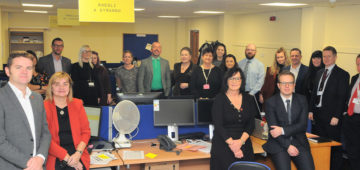The PPN workshops have been recognised as good practice. Several forces have visited Gwent, including the Mayor’s Office for Policing and Crime, to understand the difference they make to responding to vulnerable people.
‘The quality of Newport PPNs has risen sharply in recent times… You [officer] provided full details of all concerned and very eloquently explained the family situation. Although the level of alleged offending/behaviour was comparatively minor, and therefore didn’t meet the requirements for statutory intervention by Social Services, such referrals fit perfectly into the Early Intervention Project (EIP) remit. By making references to ACES and gaining consent for the sharing of information, thus allowing the EIP to offer support and/or advice to the family, your PPN may well prove to be invaluable to the child and wider family.’
- Police PPN ‘Quality assurance’ officers in Newport EIP
Sgt. McCarthy said:
“The workshop has had a positive impact on the morale of my shift. Police Officers now attach value and ownership to the Public Protection Notice knowing that the quality of information they include can have a positive impact on children and families.”
DCI Johnson said:
“Police Oficers are now picking up wider vulnerabilities such as Adverse Childhood Experiences for the children witnessing the incidents, meaning the PPNs are meaningful to partners.”
Newport Intervention Team has also seen an improvement of the quality of information recorded on PPNs:
“From an administrative perspective, it’s made my job a lot easier having better quality PPNs. The headings that have been implemented into the referrals mean that I don’t have to read thoroughly through the PPN trying to find consent. It also captures the child’s voice, which is essential and it also provides us with actions that has been put in place already by police such as welfare checks, safety plans etc.”
“PPNs have improved so much since I started with the EIP project. When I read some of the PPNs it feels like you are at the incident and you get a feel of what the family needs. You also get a feel of what risks are associated with the family.
The improvements in the quality of PPNs and obtaining consent has been hugely beneficial to the team.”
“There’s definitely more analysis of officers making sense of their observations and conversations with families which helps us to gain a perspective from both the parents and the child’s point of view. That analysis also includes the impact of the situation on the child/children which is helpful to know before making contact.”
Blaenau Gwent Families First Team have reported a great increase on the improved understanding of situation the police have responded to.
“We have noticed that the police are using a template in which to set out their PPNs. This includes things such as officer’s observations, risks, strengths, home conditions, consent and impact upon child. Having this level of understanding provides us with a much deeper understanding of the situation as a whole, the impact on the child and family and enables us to respond more efficiently and proportionally. For example, previously if someone has been at the address this may have just been detailed with the person’s name within the body of the officer’s observations only, however with the better quality PPNs if there are risk associated with this individual they will include this information within the PPN. Without this information from Police we may not have been aware that this individual posed a risk. Therefore the outcomes would have been very different. It’s also a positive where officers are detailing an area on the child and home conditions, as the officers are informing us if the child has been present, spoken to, how they presented, the impact of the contact on them and what their home is like.”
The overall feedback from the IAA Team is that the templates that Police Officers are using is providing clear guidance when completing Public Protection Notices which, in turn is providing us with a far more detailed narrative around the contact, helping us to inform decision making and assists us to achieve the right outcomes for children and their families.



